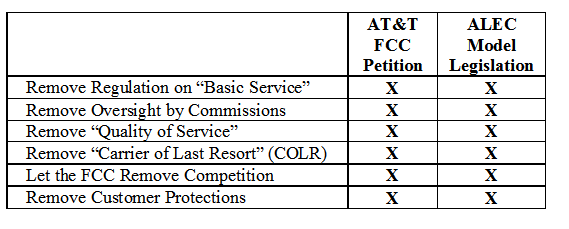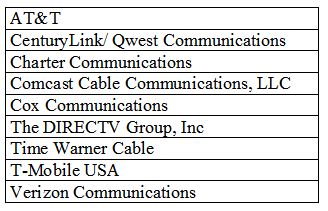AT&T, ALEC, FCC, Part 2: The AT&T FCC Petition is ALEC Model Legislation.

However, the ALEC model legislation was created by AT&T; the fact that AT&T filed a petition with the FCC to finish the ALEC state-based campaign at the federal level should come as no surprise.
Brief History
In December 2009, AT&T filed comments with the FCC as part of National Broadband Plan titled “The Transition from the Legacy Circuit-Switched Network to Broadband” which laid out, in detail, the AT&T-ALEC model of the future — remove as much regulations and obligations as possible.
In 2009, AT&T et al got the FCC to create a group within the FCC’s Technological Advisory Council (TAC) to start the process of “sunsetting” — i.e., closing down America’s utility networks — the Public Switched Telephone Networks (PSTN). As we discussed, TAC is as model of regulatory capture. AT&T and Verizon, (two of the largest incumbent phone companies who control the PSTN in their states) are not only on the committee but the majority of the TAC members have direct financial ties to either AT&T or Verizon or both.
Moreover, the TAC has been headed by Tom Wheeler, who is the Obama nominee for the new chairman of the FCC, replacing Julius Genachowski — and was former head of the cable association, the NCTA, and the wireless association, CTIA.
In August 2012, AT&T set the stage with a letter to FCC Commissioner Ajit Pai, outlining the ALEC principles.
ALEC & Your Communications: Part 1: How AT&T, ALEC and the Other Communications Companies Created Model State Legislation to Harm You
- Part 1: AT&T et al and ALEC created state-based model communications legislation which was used in many states to remove regulation and oversight.
- Part 2: ALEC state-based laws end up as principles in AT&T’s petition to the FCC to close down America’s utility networks.
NRRI Report, May 2013
“Twenty-five states had passed legislation eliminating or reducing state commission authority over telecommunications by the end of the 2012 legislative sessions. By the end of 2013, this number could increase significantly, given the legislation pending in states across the country. Legislation reducing regulatory oversight (or clarifying the deregulation initiatives passed earlier) was proposed in 20 states during the 2013 legislative session… Should the majority of the legislation pending in the 2013 sessions be enacted, nearly 70% of the states will have significantly reduced or eliminated commission jurisdiction over retail telecommunications services.”
Let’s connect the dots.
Starting in 2007, AT&T, Verizon, Centurylink and the cable companies, working with a group called the American Legislative Exchange Council (ALEC), created state-based model legislation and principles designed by the companies to accomplish one thing — the removal of all regulations, obligations and oversight on the companies’ businesses. As the NRRI report outlines, 25 states have removed some, if not all regulations and oversight, and there are more to come in 2013.

We note that Sprint/Nextel left ALEC in 2012.
Regulatory Capture of the FCC — Time to Clean House
AT&T, with the help of Verizon and the cable companies have ‘captured’ the FCC — and have been able to get the federal agency to create and shape a working group designed specifically to remove all regulations and obligations, close down the Public Switched Telephone Networks (PSTN) and create new digital dead zones.
Think of this as — Imagine taking a company to court and you find out that the judge, most of the jury, and even your lawyer has a direct financial tie to the company you are suing… Think you’ll win?
Moreover, AT&T’s FCC play is part of a massive, well choreographed, multi-year state and federal campaign being orchestrated with ALEC, the American Legislative Exchange Council, to remove all regulations and obligations and harm America’s communications users — i.e., you, dear reader…
With the Wall Street Journal reporting a changing of the guard at the FCC, with FCC Chairman Julius Genachowski and the Republican Commissioner Robert McDowell leaving in the next few months, we need new people who are going to fix, expose and stand up to the corporations, not kowtow to them.
Regulatory Capture & Financial Conflicts of Interest vs Open Government.
Comments From the Front — Friends of AT&T Want New Digital Dead Zones
What do Free State Foundation, TechNet, Tech America, the National Grange, the U.S. Cattlemen’s Association, Women Involved in Farm Economics, the Urban League and Al Sharpton have in common?
They are all backing AT&T’s FCC Petition, which has the goal to close down telecommunications networks and create digital dead zones in about 50 percent of the country. Most disturbing, many of the endorsements of AT&T contradict the needs of their own constituents.
Reverse ALEC-AT&T Legal Hackathon at Brooklyn Law BLIP
- Susan Lerner, Executive Director, Common Cause, New York & Brendan Fischer, PRWatch,– Who is the American Legislative Exchange Council (ALEC) and how do they impact public policy making?
- Bruce Kushnick, New Networks — Reversing ALEC-based communications laws and regulations. A brief history of Telecommunications, broadband and competition in the US and the current communications landscape.
- Earl Comstock — With talk of a rewrite of the Telecom Act, what needs to be done to reverse the current policies and restore competition.
- Jonathan Askin, Brooklyn Law, BLIP – VOIP and AT&T’s FCC Petition. Why access to the networks is critical to competition in information services.
- David Rosen – Content is King — From Net Neutrality to the ISP as policeman, content, including user-generated content is an issue that won’t go away.Esq.
Afternoon: (to be sent)
- Joe Plotkin, ASA networks –Competition on all levels is an imperative.
- Joly Mac Fie, ISOC-NY — Net Neutrality principles should reflect competition of Internet, broadband and phone service as well as
- Bill Skye, Esq. — New Jersey’s rural customer are not being served. Verizon, New Jersey was to be completed by 2010 with 100% of the state’s utility being upgraded. to fiber optics, with speeds capable of 45 Mbps. in both directions.
- Edyael Casaperalta, Center for Rural Strategies, Broadband in rural areas is not happening causing economic harms to cities and customers.
- Art Brodsky,How the game is played.
- Dana Spiegel, NYC Wireless.